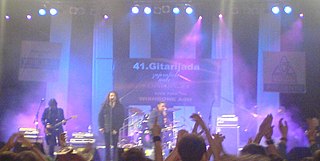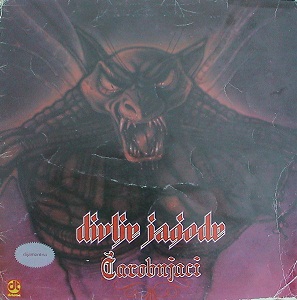
Zele is a municipality located in the Belgian province of East Flanders, around 20 kilometers east of Ghent. The municipality only comprises the town of Zele proper. In 2023, Zele had a total population of 21,374. The total area is 33 km2 which gives a population density of 641.6 people per km2.

Zlatan Stipišić, also known as Gibonni, is a Croatian singer-songwriter and composer. He is one of the most successful and awarded recording artists from Croatia, receiving record-high 43 Porin music awards for his albums and songs.

Alija "Alen" Islamović is a Bosnian rock vocalist. He is best known as the lead singer of Bosnian and Yugoslav rock bands Divlje jagode from 1979 to 1986 and Bijelo Dugme from 1986 to 1989.

Sead "Zele" Lipovača is a Bosnian guitarist, best known as the lead guitarist and founder of the popular former Yugoslav and Bosnian heavy metal band Divlje jagode.

Divlje Jagode is a Bosnian and former Yugoslavian hard rock / heavy metal band, formed in 1977. The band is widely considered to be regional pioneers of the heavy metal genre and one of the most popular and enduring icons of rock music in Bosnia and Herzegovina and former Yugoslavia. They have endured many lineup changes over the years, remained active in the music industry and retained their popularity throughout the years. In 40 years since its founding, the band have released 13 studio albums, many singles, compilation albums, and sold around 4 million records.

Davor Sučić, better known by his stage name Sejo Sexon, is a Bosnian rock and roll musician, film score composer, actor and television director. He is most notably the bandleader and a co-founder of the rock group Zabranjeno Pušenje, contributing on all Zabranjeno Pušenje releases. He was one of the founders of the New Primitivism movement in his hometown Sarajevo. As an actor, he has been featured in the Top lista nadrealista.

The Mirza Delibašić Hall, commonly known as Skenderija Hall (Скендерија), is an indoor sporting arena located in Sarajevo, Bosnia and Herzegovina, as a part of Skenderija.

Balkan was a Yugoslav rock band formed in Novi Sad in 1982. Led by guitarist and vocalist Aleksandar "Leki" Cvetković, Balkan were known for their social-related lyrics and were a prominent act of the 1980s Yugoslav rock scene.

Vladan Aksentijević, better known by his stage name Ajs Nigrutin, is a Serbian rapper and actor.

Priče o vremenu i životu – Live at SKC is the first live album by and Serbian heavy metal band Alogia, released in 2006. The album was recorded on May 13, 2005, in Studentski kulturni centar in Belgrade.

Lipovača is a village in Croatia. It is connected by the D2 highway. Administratively, village is part of town of Vukovar, seat of Vukovar-Syrmia County. Bobota Canal passes next to the village. Lipovača forms a western salient of the Town of Vukovar surrounded by the Municipality of Trpinja. The location was originally established as a pustara, a Pannonian type of hamlet.

Divlje jagode is the eponymous debut studio album by the Yugoslav and Bosnian heavy metal band Divlje Jagode released in 1979.

Motori is the third studio album by the Yugoslav and Bosnian heavy metal band Divlje Jagode. The album was recorded at Music Paark Studio in Bad Homburg vor der Höhe, Germany and was released in September 1982. It is considered the band's breakthrough album and it sold around 500,000 copies. The song "Ne želiš kraj" was written by former vocalist Ante "Toni" Janković, who previously left the group due to musical differences and was replaced by Alen Islamović. Janković joined the band on stage during the tour in support of the album.

Čarobnjaci is the fourth studio album by the Yugoslav and Bosnian heavy metal band Divlje Jagode. The album was recorded in Bad Homburg vor der Höhe, Germany and was released November 1983.

Vatra is the fifth studio album by the Yugoslav and Bosnian heavy metal band Divlje Jagode. The album was recorded at Studio RTV Sarajevo, Sarajevo, Bosnia and Herzegovina from November to December 1984, and mixed at Music Paark Studio in Bad Homburg vor der Höhe, Germany in February 1985 and was released in April 1985. It was the first time that Alen Islamović made an album just as vocal as he was before and vocalist and bassist also. The album contained nine songs with a real glam and hair metal sound, but was also influenced by the sound of Black Sabbath and Saxon, with the occasional Judas Priest riff. Islamovic wrote the lyrics for most songs, and the album had one song in English titled "Touch Me Little Girl", written by their producer Theo Werdin.

Od neba do neba is the ninth studio album by the Bosnian heavy metal band Divlje jagode, released in 2003.
Hamdija Lipovača is a Bosnian politician. He served as the Prime Minister of Una-Sana Canton from 1 February 2011 until his forced resignation three years later, following the violent protests and riots in Bosnia and Herzegovina. Lipovača was also the canton's Minister of Police. He previously served as the mayor of Bihać from 2004 to 2010.

All Stars is the second solo album by the Croatian guitarist Jurica Pađen, released through Croatia Records in December 2014. The album was recorded from July to October 2014 in ZG Zvuk Studio in Zagreb and contains 12 instrumental tracks featuring some of the most famous guitar players from the Croatian rock scene like Massimo Savić, Branimir Štulić, Husein Hasanefendić, Zele Lipovača, Neno Belan, Vedran Božić and Nikša Bratoš. The album release was followed by video for "Love Is Blue / Al Dente", featuring Drugi Način guitarist Mario Domazet. The second single released was "Prijateljska vatra" in June 2015, featuring Branimir Štulić. The album debuted at #30 and topped at #10 on the official Croatian Top 40 domestic albums selling chart and at #11 on the combined domestic/foreign chart. The album was nominated in two categories on 22nd Porin Music Award in 2015 and was awarded for "Instrumental Album of the Year ".

Dalibor Andonov, known professionally as Gru, was a Serbian musician, DJ, rapper and actor. His song Biću tu from the 1996 album Gru 2, gained him popularity in Eastern Europe, as well as the 2010 release I dalje me žele alongside Serbian rapper Ajs Nigrutin. His album Gru 2 is the most commercially successful album in Serbia, selling four million copies, and reaching certified gold status in Serbia. Other than his immense popularity in the Balkans, he is well known in other countries of Eastern and Northern Europe. He has been dubbed The Serbian Rap Machine.


















